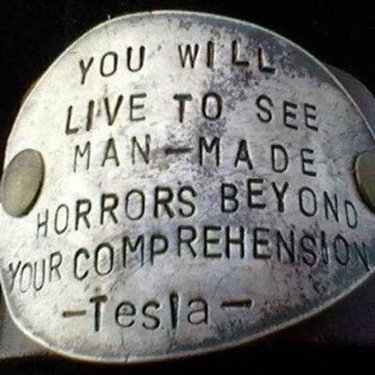Archive for May, 2019
08 May 2019


Prices will be going on on pre-emissions Beetles and people will be reprinting the old John Muir Fix-That-VW-Yourself Guide.
Our Corporate Overlords are rapidly developing driverless cars, and advanced thinkers are already talking about banning driving a car yourself altogether.
The New Yorker recently reported that a new group has been created specifically to defend the Freedom to Drive.
Safety has long been a central argument for the adoption of driverless cars. According to the National Highway Traffic Safety Administration, ninety-four per cent of serious crashes are due to human error, and some thirty-five thousand Americans die in traffic-related accidents each year. Autonomous-vehicle makers claim that, by seeing more and responding faster than human drivers can, their cars will save thousands of lives. According to this logic, not adopting autonomous-vehicle technology would be irresponsible—even unethical. “People may outlaw driving cars because it’s too dangerous,†Elon Musk said, at a technology conference, in 2015. (“To be clear, Tesla is strongly in favor of people being allowed to drive their cars and always will be,†he elaborated later, on Twitter. “Hopefully, that is obvious. However, when self-driving cars become safer than human-driven cars, the public may outlaw the latter. Hopefully not.â€)
Perhaps it was inevitable that a nascent right-to-drive movement would spring up in America, where—as fervent gun-rights advocates and anti-vaccinators have shown—we seem intent on preserving freedom of choice even if it kills us. “People outside the United States look at it with bewilderment,†Toby Walsh, an Australian artificial-intelligence researcher, told me. In his book “Machines That Think: The Future of Artificial Intelligence,†from 2018, Walsh predicts that, by 2050, autonomous vehicles will be so safe that we won’t be allowed to drive our own cars. Unlike Roy, he believes that we will neither notice nor care. In Walsh’s view, a constitutional amendment protecting the right to drive would be as misguided as the Second Amendment. “We will look back on this time in fifty years and think it was the Wild West,†he went on. “The only challenge is, how do we get to zero road deaths? We’re only going to get there by removing the human.â€
[Meredith] Broussard [a former software developer who is now a professor of data journalism at New York University, and author of the recent book, “Artificial Unintelligence: How Computers Misunderstand the Worldâ€] has a term for the insistence that computers can do everything better than humans can: technochauvinism. “Most of the autonomous-vehicle manufacturers are technochauvinists,†she said. “The big spike in distracted-driving traffic accidents and fatalities in the past several years has been from people texting and driving. The argument that the cars themselves are the problem is not really looking at the correct issue. We would be substantially safer if we put cell-phone-jamming devices in cars. And we already have that technology.†Like Roy, she strongly disputes both the imminence and the safety of driverless technology. “There comes a point at which you have to divorce fantasy from reality, and the reality is that autonomous vehicles are two-ton killing machines. They do not work as well as advocates would have you believe.â€
Rather than create a constitutional amendment, Broussard argues that drivers should resist laws that would take away their existing rights. Although steering wheels are legally mandatory, the SELF DRIVE Act, which passed the House in 2017, would allow autonomous-vehicle companies to request exemptions from tens of thousands of other regulations. (The Act died in the Senate, but driverless-car companies are urging Congress to take it up again this year.) According to Broussard, the best way to protect the right to drive may be simply to defeat laws that would legalize autonomous vehicles. “We can challenge the notion that autonomous vehicles are inevitable,†she said. “They are not even legal right now.â€
RTWT
Those driverless cars will all be equipped with Internet connections telling the companies that built them and the government exactly where you are and allowing either to disable your vehicle at will. You will need Big Brother’s permission to go anywhere.
Automobiles are already far too loaded with safety features; stripped of conveniences like spare tires, dip sticks, and vent windows; and calculatingly contrived to deny their owners the ability to make repairs themselves.
Our freedom of choice has been incrementally removed year by year. Next they will taking away our Freedom to Drive altogether.
Join the HDA:

07 May 2019

Dani had a cup of Starbucks.
07 May 2019


Washington Post:
[A] small newspaper, based out of Liberty, a Texas town of 75,000 outside of Houston, planned to post the Declaration of Independence on Facebook in 12 daily installments leading up to the Fourth of July — 242 years since the document was adopted at the Second Continental Congress in 1776.
But on the 10th day, the Vindicator’s latest installment was removed by Facebook. The company told the newspaper that the particular passage, which included the phrase “merciless Indian Savages,†went against its “standards on hate speech,†the newspaper wrote.
The story about how Facebook had censored one of the United States’ founding texts on the grounds that it was hate speech has traveled around the world. And it is another glaring example of how the mechanisms that tech companies use to regulate user content — many of which involve algorithms and other automated processes — can result in embarrassing errors. Facebook uses a mix of human work and technological efforts to moderate its content.
Facebook has since apologized to the Vindicator and restored the newspaper’s post.
“The post was removed by mistake and restored as soon as we looked into it,†the company said in a statement distributed by spokeswoman Sarah Pollack. “We process millions of reports each week, and sometimes we get things wrong.â€
RTWT
Hilarious, of course. Just imagine the embarrassment in Menlo Park.
But, not really surprising, considering Silicon Valley’s aggressive Politically Correct Intolerance and its penchant for Diversity in hiring. Why should anyone expect a recent Comp Sci graduate originating from Dehli or Damascus or Guangzhou to recognize the text of the Declaration, or identify 18th Century English, by sight?
It seems to me that the inconsistency of the policy is also intellectually even more embarrassing. In the end, Thomas Jefferson (for now) gets a pass. You and I don’t, and outside Facebook, people of the same mentality are right now pulling down statues of formerly sacred heroes from Christopher Columbus to Robert E. Lee to William McKinley.
07 May 2019

A prediction made by Nikola Tesla shortly before his death in 1943.
06 May 2019


USA Today’s Bill Wolken was one of many not happy with the stewards’ Saturday decision.
They’ll be talking about the result of this race from now until they run the next Kentucky Derby and the next 10 Kentucky Derbys and the next 20 Kentucky Derbys,†said Bill Mott, the trainer of Country House. “There’s always a lot of controversy in this sport, and we’re probably going to be involved in it from now on, but you know, I’m going to take it.â€
Don’t blame Mott for thinking that justice was done by taking down Maximum Security and placing him 17th due to an incident halfway around the final turn that compromised the chances of the two horses who were racing between Maximum Security and Country House. Mott, like every trainer who has been successful in this business, has been on both sides of these situations dozens of times. For him, it’s just part of the business.
But there’s a reason the Derby, which is always a roughly run race with plenty of bumping and jostling throughout, has never had a winner disqualified due to interference: Unless the foul was egregious enough to clearly change the result, the horse that finished first under the wire should stand.
That standard wasn’t met on Saturday. Not by a wide margin.
RTWT
Personally, I agree, and I served as a Field Judge at Steeplechase Races in Virginia.
Lengthy and impartial analysis at Sports Illustrated.
04 May 2019

Better photos here: Guardian.
Nepal Army says: “Just a bear.” link
32″ long is awfully big.
03 May 2019

San Angelo Live Outdoors:
EAGLE PASS, TX — A tiger has been spotted in the Rio Grande today, according to social media rumors.
The pictures first surfaced by a social media page from Nuevo Laredo, Mexico. …
According to the Eagle Pass News Leader, the images have not been confirmed to be in the Rio Grande, but many believe it to be in Laredo.
Many questions have been buzzing around Facebook about where the tiger came from and many of them have named the tiger “El Tigre Del Sur” or the tiger from the south.
A year ago today, the Washington Post reported that Federal agents peered into a duffel bag on the Mexico border. They found a tiger cub. So, the idea that a tiger was hanging out on the banks of the Rio Grande is not that far-fetched.
The original photos are on Facebook here.
03 May 2019

In Science, for a theory to be believed, in must make a new prediction –different from those made by previous theories– for an experiment not yet done. For the experiment to be meaningful, we must be able to get an answer that disagrees with that prediction. When that is the case, we say that a theory is falsifiable –vulnerable to being shown false. The theory also has to be confirmable; it must be possible to verify a new prediction that only this theory makes. Only when a theory has been tested and the results agree with the theory do we advance the theory to the ranks of true theories.
— Lee Smolin
/div>

Feeds
|
















